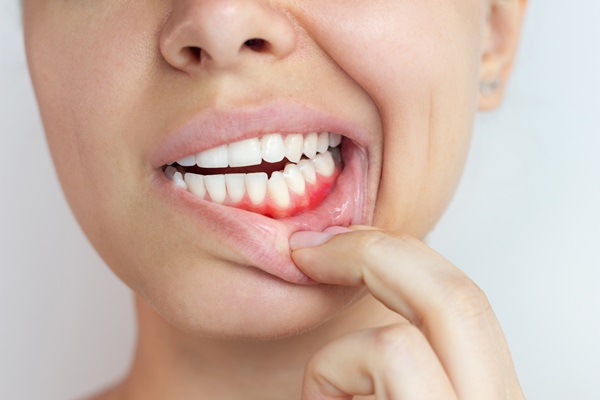What Gum Disease Looks Like

You should be as concerned about gum disease as you are tooth decay. This condition can affect your oral health and overall wellness. It is important to recognize the signs and symptoms of this disease so you can treat it properly. There are also risk factors that lead to the condition and ways you can prevent it. Your dentist can help you slow down its development and recommend effective ways to fight it.
The basics of gum disease
This condition develops in a person’s mouth because of bacteria on the gums and at the gumline. This will start to inflame the gums, redden them, and cause them to bleed. At this point, it is known as gingivitis. If the patient does not treat it, the disease can escalate and become periodontal disease. The same symptoms will worsen, and the patient’s gums will also start to separate from the teeth, leaving gaps. In these spaces, bacteria will form, leading to infections.
People who are prone to having the condition
Gum disease can affect people at any age. People are most likely to get it when they do not brush at least twice a day and floss daily. Failing to go to the dentist regularly for exams and teeth cleanings will also put a person at higher risk of having the disease. Older people are also more susceptible to the illness. Genetics can also play a role in gum health and disease prevention.
The effects
Early on, gum disease may only have minor consequences. The gums may be swollen, and they may bleed when the individual brushes them. Over time, the condition can worsen as it develops from gingivitis into periodontitis. At this point, the gums may recede as they pull away from the teeth. This can create pockets where bacteria grow.
If this disease is left untreated, bone loss can occur, causing teeth to shift or become loose. The bacteria can spread throughout the mouth and into other parts of the body. Infections can develop and get into the bloodstream. People with extreme cases of gum disease can eventually have cardiovascular problems and suffer heart attacks or strokes.
Keeping it away and treating it
The most effective way to battle gum disease is to brush and floss daily. These activities prevent the buildup of plaque and bacteria-causing tartar. Regular teeth cleanings will also help. At these appointments, the hygienist will scrape away plaque from the teeth and gumline. In more advanced cases, the dentist may recommend root planing or scaling.
Live healthily, avoid gum issues
Your gums are as important as your teeth when it comes to oral health care. Just like combatting tooth decay, you can fight off gum disease by practicing good oral hygiene. If you start to see the signs of gingivitis, make sure you see your dentist right away. If you catch these effects early enough, you can reverse them and regain your health and wellness. Make an appointment with your dentist today for an examination of your gums.
Request an appointment here: https://www.dentalexcellencegroupnj.com or call Dental Excellence Group at (201) 244-7244 for an appointment in our Dumont office.
Check out what others are saying about our dental services on Yelp: Gum Disease in Dumont, NJ.
Related Posts
Gum recession is a common dental condition where the gum tissue surrounding the teeth pulls back, exposing more of the tooth or its root. Understanding the causes of gum recession is essential for prevention and treatment. By addressing this issue promptly, a periodontist can prevent more serious dental problems in the future.Gum recession can result…
Laser dentistry is a relatively young concept that can target diseased soft tissue and improve the health of gums, jawbone, and more. Dental lasers are approved by the Food and Drug Administration (FDA), and the risks of the procedure are minimal. Subsequently, dentists often recommend laser dentistry for deep dental cleaning procedures. A routine dental cleaning…
An emergency dentist provides immediate care for urgent dental issues. Dental emergencies can happen anytime, often causing pain or discomfort that cannot wait for a regular appointment. Recognizing the signs of a dental emergency helps patients seek the right care quickly and can prevent further complications and protect their oral health.A dental emergency calls for…
When deciding between two popular tooth replacement options, such as dental bridges or dental implants, consulting a dentist is key. Bridges have long been a trusted solution, while implants are modern and innovative. However, when recommending an option, a dentist will consider factors like oral health, personal preferences, and lifestyle needs.Dental bridges are the traditional…
